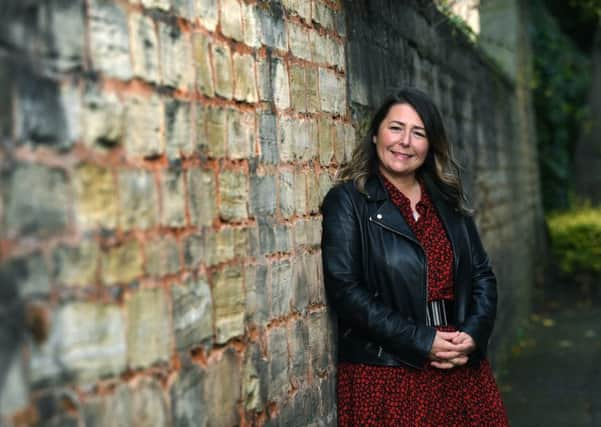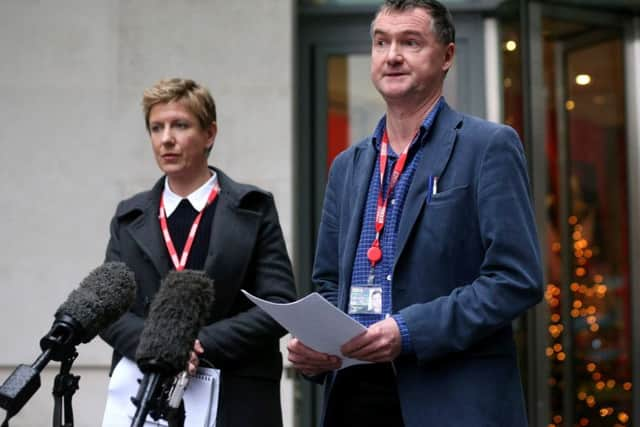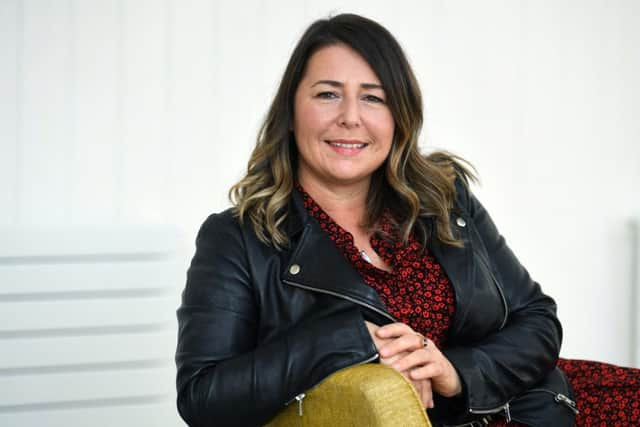‘What I learnt from surviving rape at 17 - and how Jimmy Savile scandal helped me bring my attacker to justice after two decades’


Jennifer Potter’s autobiographical book that sets out her long and often painful journey to seeing the man who raped her when she 17 finally convicted for his crime two decades later begins with a startling insight.
“I’m a big believer that the worst of life’s traumas can become a gift for us,” she writes. “It sounds counter-intuitive but I have come to see that being raped has also given me many gifts.”
Advertisement
Hide AdAdvertisement
Hide AdNow running her own business in Yorkshire working with individuals and organisations to develop people as an executive coach, Potter acknowledges to me that the concept is a challenging one.


But she says that her response to what she went through has led her to have greater empathy with others, led to new friendships and brought about a new career helping others.
“It is about the way you process things that have happened to you. You have to accept they have happened when you are ready and when you are strong enough to accept them. If you tell yourself it has ruined your life that becomes the reality,” she says. “I’m probably stronger than I would have been had it not happened to me, I’m more fierce around my boundaries and as a coach and someone who has gone to dark places myself, I can support people who have also been in similar situations.”
Advertisement
Hide AdAdvertisement
Hide AdOriginally from the Barnsley area but now living in North Yorkshire, Potter’s book – Stronger. Braver. Wiser – was originally self-published in November 2017 shortly after her rapist had been convicted and sentenced to five years in jail. The book was then picked up by Trigger Publishing last year and was published in a revised form in November 2018.


She says her ambition with the book is largely to help other victims of sexual abuse as well as their families and friends.
“The reason for writing the book is there is so little attention focused on the victims in these cases. During the court process, you are a bit of data or a bit of evidence rather than a human. I spent a lot of time in denial that it hadn’t happened to me and I wasn’t affected by it. But it does affect you on a very deep level.
Advertisement
Hide AdAdvertisement
Hide Ad“I spent a lot of time in denial that it hadn’t happened to me and I wasn’t affected by it. But it does affect you on a very deep level. There is a perception that rape ruins lives and that your life will never be the same again, that you are damaged goods and broken. I wanted to write this to say ‘You can recover from this’. Yes, it has changed your life and will have an impact but you can love yourself again and be in a healthy relationship with others.”
Potter was 17 years old when she was raped by a distant relative she and her parents knew well. She told two friends, a doctor and her parents what had happened shortly afterwards but despite her parents wanting her to go to the police, on the cusp of going to university and fearing the repercussions from making a report, Jennifer made the agonising decision not to report it and put the attack “in a box”.
“It was the early 1990s, it was different back then. The messages you saw on TV and in the media were that if you were a victim of abuse you must have been asking for it somehow, that it was somehow your fault.
“I was 17. It is quite a key age and it crushed my confidence quite a lot. I was about to go to university and I just didn’t want all the attention. I had a real sense of responsibility that it was going to affect more people than just me.”
Advertisement
Hide AdAdvertisement
Hide AdShe went on to forge a successful career in marketing, living in Berkshire. But in November 2012, 19 years after being raped Jennifer made the decision to report what had happened to her to the police following two events – moving back to Yorkshire to set up her own business leading to a greater sense of personal empowerment and the emergence of the Jimmy Savile scandal.
“The press seemed to be reporting differently to the way it had 20 years before. The story was everywhere, it was so big and so disgusting. The narrative changed that it was actually the responsibility of the attackers and abusers. There seemed to be more gentleness and care towards the victims. I had also spent a long time thinking this didn’t happen to many people. It made me realise it happens a lot.
“If the Jimmy Savile story had never come out, I might never have spoken out. Now I am helping other people. From the people I have met as a result, two of my closest friends are survivors.”
The book gives an unflinching account of what it is like to give evidence as a rape complainant, describing how the defence barrister immediately accused her of instigating sex with her attacker and making up the rape allegations as an “attempt at covering over your shame”, then repeatedly accused her of lying while asking uncomfortable questions about the precise act of sex.
Advertisement
Hide AdAdvertisement
Hide Ad“It was excruciatingly awkward and felt shameful,” the book recounts. “I felt parts of myself crumbling away: dignity, pride, confidence, strength.”
Jennifer reflects today: “The quality and care the police gave me was absolutely amazing but five years ago at least the court experience hadn’t caught up at all. It really is you versus him, you are part of the evidence. Before you go in to give evidence, the defence know what you have said and have prepared their ‘version of events’. The defence lawyer is hired to get their client off and I understand that.
“I was prepared but didn’t know what line of inquiry he would take. I found that part of the process really hard. The prosecutor said whatever line of inquiry the defence barrister takes, it doesn’t mean he believes his client. But I felt like I ended up with secondary PTSD, I felt violated by the barrister.”
Her rapist was found guilty by majority verdict and sentenced to five years in prison. But when I ask whether she would encourage other rape victims to take their cases to court if possible, she takes a deep breath before responding.
Advertisement
Hide AdAdvertisement
Hide Ad“It is such a difficult one. The police only put forward cases where they think the evidence is strong enough to get a guilty conviction because of how stressful it is for victims. But even then, only one in three cases get a guilty verdict.
“Many people in society think ‘not guilty’ means ‘innocent’. But the jury have to be 100 per cent certain to convict, one per cent of doubt is a not guilty. Of course you don’t want wrongly accused people going to prison but I know I was really lucky to get a guilty verdict in my case. I would definitely encourage people to go to the police, it doesn’t mean you have to go to court. At least having it reported somewhere is a step towards taking your power back.”
She also suggests victims of sexual assault and abuse should approach charities such as IDAS as a way of getting support rather that leaves the door open to go to the police if an individual eventually feels ready to do so.
After the trial, Potter decided to write the book about her experiences - reflecting on the therapy she has been through and the ups and downs of her journey.
Advertisement
Hide AdAdvertisement
Hide Ad“I’m quite a creative person - I felt the book was in me and it needed to come out. I really felt I could do a lot to help other people recover. The words came out really easily but the editing took forever.
“I originally thought I can’t put this out there, I had kept the court case quite quiet and I was trying to build a business. But actually when I showed it to a few people, they said Jen this is really good and isn’t it amazing you have done this.”
She decided to go public about her case as a way of raising funds to get the book published.
“I had a few rejections from publishers and I spoke to someone who said you should self-publish and do a crowd-funder to get the money. Coming from a tech background, I liked the idea, I love pulling a community of people together. I had great support from family and friends. There wasn’t a grand plan but it got the book made.”
Advertisement
Hide AdAdvertisement
Hide AdOpening up about her own experiences has led to different avenues in helping other survivors – part of what Jennifer sees as the “gift” she has taken from what happened.
She spoke to hundreds of people at an event in Manchester alongside journalist Meirion Jones who helped expose the Savile scandal, while she is now an associate for the On Road Media charity, facilitating discussions between abuse survivors and staff at major organisations in the media like The Guardian, CBBC and press regulator IPSO. It was when she was running an event at the latter organisation for IPSO’s Journalists’ Panel that I met her, leading to this article.
“When survivors contact me to say they have read the book, sometimes people have said it has changed their life and it makes it feel totally worthwhile,” she says. “But it does make think two things – firstly what if they need more than the book? The second thing is I think I could always be helping so many more people.
“I would love for the book to be finding its way to more people, I would like it to find its way to more charities.”
Advertisement
Hide AdAdvertisement
Hide AdHer rapist, who Potter has asked not to be named in this article, is out on licence from prison and his sentence will come to an end next year. She says it has led her to reflect again on her case and to give this message to fellow survivors: “I get asked a lot if I can find forgiveness for my attacker. What I have learnt is the only person you need to forgive is yourself. Abusers are responsible for their actions, you are not. “You don’t need to forgive them but you need to forgive yourself.”
Family support ‘was fundamental’
Potter says the support of her parents has been vital in helping her both bring her rapist to justice and move forward with her life.
She says her mother and father have found it difficult in many ways to come to terms with what has happened but have been a indispensable support and are proud of her helping others who have been in similar situations.
“It has been a journey for the three of us. Overall they are immensely proud. My dad feels a lot of responsibility, he wished things had been different back then.
“But the fact they believed me was fundamental. Knowing my mum and dad have fully believed me was huge.”
Stronger, Braver, Wiser is published by Trigger Publishing. It can be purchased on Amazon.